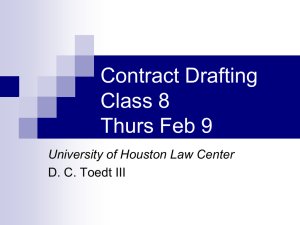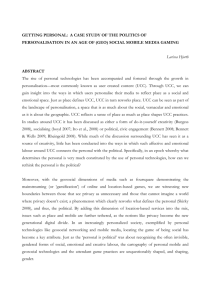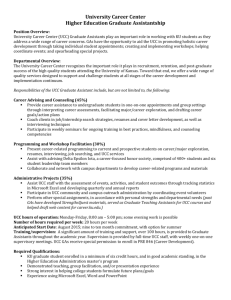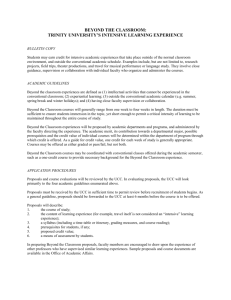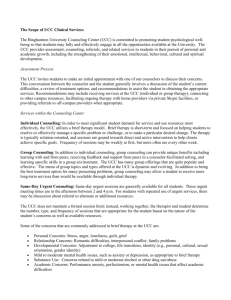Contracts: Short OutlinE
advertisement
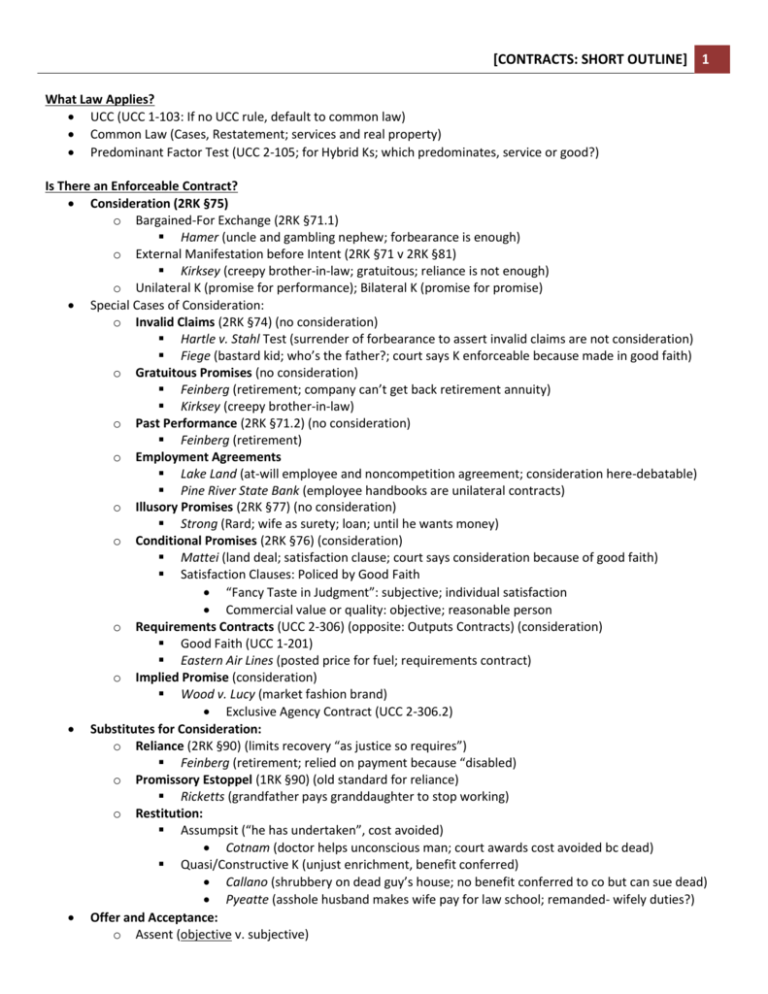
[CONTRACTS: SHORT OUTLINE] 1 What Law Applies? UCC (UCC 1-103: If no UCC rule, default to common law) Common Law (Cases, Restatement; services and real property) Predominant Factor Test (UCC 2-105; for Hybrid Ks; which predominates, service or good?) Is There an Enforceable Contract? Consideration (2RK §75) o Bargained-For Exchange (2RK §71.1) Hamer (uncle and gambling nephew; forbearance is enough) o External Manifestation before Intent (2RK §71 v 2RK §81) Kirksey (creepy brother-in-law; gratuitous; reliance is not enough) o Unilateral K (promise for performance); Bilateral K (promise for promise) Special Cases of Consideration: o Invalid Claims (2RK §74) (no consideration) Hartle v. Stahl Test (surrender of forbearance to assert invalid claims are not consideration) Fiege (bastard kid; who’s the father?; court says K enforceable because made in good faith) o Gratuitous Promises (no consideration) Feinberg (retirement; company can’t get back retirement annuity) Kirksey (creepy brother-in-law) o Past Performance (2RK §71.2) (no consideration) Feinberg (retirement) o Employment Agreements Lake Land (at-will employee and noncompetition agreement; consideration here-debatable) Pine River State Bank (employee handbooks are unilateral contracts) o Illusory Promises (2RK §77) (no consideration) Strong (Rard; wife as surety; loan; until he wants money) o Conditional Promises (2RK §76) (consideration) Mattei (land deal; satisfaction clause; court says consideration because of good faith) Satisfaction Clauses: Policed by Good Faith “Fancy Taste in Judgment”: subjective; individual satisfaction Commercial value or quality: objective; reasonable person o Requirements Contracts (UCC 2-306) (opposite: Outputs Contracts) (consideration) Good Faith (UCC 1-201) Eastern Air Lines (posted price for fuel; requirements contract) o Implied Promise (consideration) Wood v. Lucy (market fashion brand) Exclusive Agency Contract (UCC 2-306.2) Substitutes for Consideration: o Reliance (2RK §90) (limits recovery “as justice so requires”) Feinberg (retirement; relied on payment because “disabled) o Promissory Estoppel (1RK §90) (old standard for reliance) Ricketts (grandfather pays granddaughter to stop working) o Restitution: Assumpsit (“he has undertaken”, cost avoided) Cotnam (doctor helps unconscious man; court awards cost avoided bc dead) Quasi/Constructive K (unjust enrichment, benefit conferred) Callano (shrubbery on dead guy’s house; no benefit conferred to co but can sue dead) Pyeatte (asshole husband makes wife pay for law school; remanded- wifely duties?) Offer and Acceptance: o Assent (objective v. subjective) [CONTRACTS: SHORT OUTLINE] 2 Lucy v. Zehmer (drunkies accidentally sell farm; outward manifestation matters) o Intent to be Bound Consarc Test (1. Mutual assent to exchange acts/promises sufficient to create binding K; 2. To avoid K, party must express intent not to be bound) Winston Factors Test (whether there has been…express reservation of right not to be bound; partial performance; all terms agreed upon; type of K usually committed to writing) Offer (2RK §29) (UCC 2-206) (Test: can offeree create K just by saying “I accept”?; specific) o Invitation to Deal (not offers) Owen (land owner says impossible to sell for less than $16K) Price Quotes Fairmount (order for carloads of glass; K formed b/c intent to be bound, price and quantity agreed to in price quote carry over) Auctions (UCC 2-328) (2RK §28) (invitations to deal unless selling “without reserve”) Advertisements (generally invitations to deal unless clear, definite, specific quantity term) Lefkowitz (man wants to by lady stole; first come first serve restricts offer to ltd number) o General Offers Rewards (offers because restricted usually to one person) o Construction Contracts Rescission Kemper Test (1. Mistake is material 2. Mistake not a result of legal duty 3. Enforcement is unconscionable 4. Other party can be placed in status quo 5. Party seeking relief gives prompt notice (discovery) 6. Party seeking relief restores/offers to restore everything) Elsinore (contractor discovers missing plumbing bill; rescission okay) Lamoge (5%, not enough); Kemper (30%); Kastorff (10%) Acceptance (2RK §30) (UCC 2-206) o Notification: Bilateral (necessary) International Filter (Conroe Gin; acceptance upon signing by executive bc this was contracted) Unilateral (not necessary unless person wouldn’t know) Silence is not acceptance By Performance (2RK §53.1) (new rule: only if offer invites such acceptance) Allied Steel (Ford starts performing; indemnity K; court says this is acceptance; old rule) o Nonconforming Goods as Accommodation (UCC 2-206) (acts as counteroffer) Corinthian Pharmaceuticals (more expensive vaccine shipped at cheaper price; court says accommodation not performance on K because of notice) Termination of the Power of Acceptance: o Lapse (reasonable time; face to face) o Revocation (common law—revocable up until accepted; from perspective of reasonable offeree) Direct Revocation (2RK §42) Indirect Revocation (2RK §43) Dickinson (“leave offer open until 9am”; Hoover test; court says no K because knew he was selling to someone else) Hoover Test (telling someone else is considered indirect revocation) Options Contracts (2RK §257) (leave offer open; consideration or reliance required) Dickinson (“leave offer open until 9am”; Hoover test; court says not an options K) Options Contracts Created by Part Performance/Tender (2RK §45) (only for unilateral K) o Ragosta (forkshop and bank loan; no K because loan is not part of performance) Firm Offers (UCC 2-205) General Offers (2RK §46) (acceptance terminated when notice of termination given publicly) [CONTRACTS: SHORT OUTLINE] 3 o Death/Incapacity (exception: options Ks) o Offeree’s Rejection (2RK §37) Mailbox Rule: o Conditions: Acceptance and offer made in the same form (2RK §63) Acceptance effective upon dispatch (2RK §62) Offers effective upon receipt Rejection effective upon receipt (2RK §40) Offer irrevocable and acceptance effective upon receipt o Special Cases: Overtaking Rejection (ARRA)—no K formed Overtaking Acceptance (RAAR)—K formed Weird Situation (RARA)—no K formed; later A is counteroffer Battle of the Forms: o Mirror Image Rule Last Shot Rule (mitigated in practice; implied or precatory/suggestive terms) Transcending the Mirror Image Rule (UCC 2-207) Additional Terms: 2-207.1 Is a Contract Formed? 1. Definite and Seasonable (terms of offer and acceptance similar) 2. Sent in Reasonable Amount of Time 3. Operates as Acceptance (even though terms are different) 4. Buyer's acceptance is not expressly conditional. Yes (UCC 2-207.2) 1. Both parties are merchants 2. Offer doesn't expresly limit acceptance to terms of offer 3. Offeror doesn't object 4. Can't materially alter offer No (UCC 2-207.3) Contract Becomes: Gap Filler (2-300) + Original Terms in Writing Diffferent Terms (UCC 2207) Run through UCC 2207.1 Majority Rule: Knockout -Knock out terms of different Contract -UCC 2-300 provides gap-fillers Minority Rule: Dropout -Offeree's terms drop out -Offeror's terms win Other Minority Rule: Posner -Assimilate different/additional terms and treat the same Policy: The statute doesn't say "different," so we shouldn't include it. Policy: UCC favors the buyer over the terms of the "Last Shot Rule" Policy: UCC forgot to add "different" to text as evidenced by Comment 3 Materiality: "Surprise" Test An alteration is material if consent cannot be presumed. [CONTRACTS: SHORT OUTLINE] 4 o Materiality and Surprise Test (based on industry standard) Northrop v. Litronic (defense K for wiring boards with different warranty terms; material) o Additional Terms: Dorton (carpet man; arbitration is additional term and material under UCC) Itoh (steel coils; expressly conditional acceptance) o Different Terms: Northrop v. Litronic (defense K for wiring boards with different warranty terms; majority rule) Precontractual Liability (Rare) (UCC does not have a good faith in negotiation requirement) o Orthodox K Doctrine (no binding K until O/A; liability can still be incurred beforehand) o Drennan Rule (2RK §45 + 1RK §90 = 2RK §87.2); also uses 2RK §32 (choose unilat/bilat if unclear) Drennan (subcontractor’s bid too low; court says revocation not allowed bc implied promise that he keeps offer open and contractor relies) o Restitution when party has conferred benefit in negotiations Songbird (plane broker company; court says service voluntary and protects self) Precision Testing (car test emissions cert do not benefit self) o Reliance for misrepresentation in negotiations Markov (warehouse scammer; tried to sell and lease at same time) o Reliance before negotiations (extremely rare) Red Owl (franchise scam awards reliance based on 1RK §90) Statute of Frauds: o Does SoF Apply? (if more than one kind of K, has to satisfy requirements for each category) Performance can’t be complete in less than one year Majority Rule: any chance it couldn’t be complete in one year Minority Rule: reasonable/probable performance in one year Exception: full performance has already occurred Agreement for transfer of real estate Exception: leases less than one year; part performance (permanent improvements are evidence of K) Surety agreements (promise to answer for debt of another) Exception: if main benefit is for surety Agreement for sale of goods $500 and over (UCC 2-201) Writing must have quantity term, signature, indicate K for sale has been made; does not need every term or correct terms Exceptions: (UCC 2-201.3) o Special order good with no market o Rule of Effrontery (admits to K; only enforceable to quantity/price admitted) o Payment made/goods accepted o Merchant’s Exception (between merchants; reasonable amount of time; sufficient against sender; received/delivered; can object in 10 days in writing) St. Ansgar Mills (grain dealer says no enforceable K because written confirmation not delivered in reasonable amount of time; court says reasonable based on conduct) o Is there a writing? UCC 1-201(b)(43) (can be more than one doc) UCC 1-201(b)(37) (lenience in signature; can be marking or stamp) o Exception? o Reliance prevents enforcement? (2RK §139, §30 must be satisfied) (caution: split on applicability to UCC) Majority Rule: must rely to point that agreement would have been reduced to writing Monarco (relative gets screwed out of land after working lifetime for family; court says two factors award reliance—unconscionable injury to P; unjust enrichment to D) [CONTRACTS: SHORT OUTLINE] 5 Defenses to K Formation: o Capacity (minors—voidable except for necessities; mentally infirm; drunks) Kiefer (minor buys car; under 21 clause on K; can’t sue) o Overreaching/Duress (2RK §175-176) (must show resistance; exception: threats of legal activity) Alaska Packers (workers quit and demand more money; no replacement workers avail; duress) Pre-Existing Duty Rule (2RK §73—consideration required; UCC 2-209—good faith required) Watkins (cellar excavation paused, bigger rock more money demanded, no protest; no duress) o Concealment (no good faith requirement for negotiation) Swinton (termites; no requirement to disclose bc pure concealment; latent defect) Kannavos (8 apt unit house against code; concealment bc unpure concealment; patent defect) Pure Concealment (no partial disclosure made or allowed) Latent Defect (not discoverable) Patent Defect (discoverable) o Misrepresentation (scienter/malintent and factual material; exception: fiduciary relationship and superior knowledge) Vokes (dancing grandma tricked into buying tons of dance lessons; exception case) What Does the Contract Mean? Parol Evidence Rule (says when prior terms make it into a K) o Exceptions: Later Agreements (2RK §123); extrinsic evidence still used to prove fraud/validity of agree. o No Oral Modification Clause (nothing after the writing makes it in; in practice, can use later agree.) o Merger/Zipper Clause (nothing before the writing makes it in) o Integrated Agreement Test (2RK §209.2, 210.3) No: Unintegrated Agreement Is there a writing that is a final expression between the parties? Yes: Integrated Agreement (2RK §209, 215) o o o o o Is the writing a complete and exclusive statement of the terms of agreement? (Use Four Tests) Not Adopted: Partially Integrated Adopted: Completely Integrated (2RK §210, 216) Unintegrated (add and contradict terms, including subtractions) Partially Integrated (can add; can’t contradict) Completely Integrated (can’t add or contradict) Gianni (no tobacco, no soda not included in K; terms stay out) Test: (restrict.) naturally and normally would have been included? Yesnot allowed in, completely integrated Masterson (ranch w/ buyback provision, gov. scammers; terms let in) Test (1RK): could term be made as separate agreement? Yes partially integrated, allowed in 2RK 216(2)(b) Test: Naturally would have been omitted? Yes partially integrated; allowed in UCC Test (least restrict.): terms certainly would have been included? Yes not allowed in, completely integrated In cases of left out terms due to Mutual Mistake, parol evidence rule does not apply! [CONTRACTS: SHORT OUTLINE] 6 Bollinger (construction topsoil replacement; court says have to honor bc performed) Plain Meaning Rule/ Four Corners Rule (question of law; scope of review-erroneous) o Test: Is the term ambiguous? (can use dictionary, referenced docs, UCC trade usage) If so, use extrinsic evidence to determine meaning. o New York Jurisdictions: only use the document to determine if term is ambiguous o Traynor’s Rule/California Jurisdictions: use extrinsic evidence to determine if the term is ambiguous o Pacific Gas (indemnity clause for property loss; Traynor rule created) (CA) o Greenfield (Ronnettes, synchronization record rights, not ambiguous) (NY) o Trident (loan repayment; have to apply CA rule, reverse and remand) (CA) o Extrinsic Evidence in UCC (UCC 2-202) (Ranked by import) Express Terms Course of Performance (UCC 1-303a) (performing on K in question) Course of Dealing (UCC 1-303b) (regards to other Ks between parties) Usage of Trade (UCC 1-303c) (trade behavior; exception: if person is new to trade, not applicable unless should have known; jury question) Frigaliment (Friendly’s “what is chicken?”) (NY) Hurst (50% horse meat not really 50%) (CA) Nanakuli (requirements K for asphalt; “price” includes price protect as industry standard) Columbia Nitrogen (options K for sulfur w/ merger clause; can use UCC w/ this if not negated) Limits on Objective Interpretation: o Old Rule: Latent Ambiguity (does not readily appear in document; arises from application) Raffles (cotton sales referred to 2 diff shipments on 2 diff ships with same name) Oswald (swiss coins v swiss coin collection) Rule: no meeting of the minds, no K Patent Ambiguity (ambiguity that appears on face of K; arising from language) Colfax (union printing press sent to arbitration b/c ambiguity was patent) o New Rule: If neither side can prove what the other is thinking, equally blamable, no K (2RK §201) Implied Warranties and Gap Filling (Can generally K around default terms; quantity is essential and must be included) (UCC 1-302) o Caveat Emptor (buyer beware; contract for quality) o Implied Warranty of Merchantability (UCC 2-314) Koken (fire blanket used as welding shield; failed to prove ordinary use via expert) o Implied Warranty of Fitness (UCC 2-315) Lewis v. Mobil (wrong fluid for hydraulic system; subjective standard; judgment for P) o Express Warranties (Test: affirmation of fact or promise, relates to goods, basis of bargain) (UCC 2-313) Bayliner (sale of ship; “gets you to prime fishing grounds” considered opinion) o Excluding Implied Warranties (UCC 2-316) South Carolina Electric and Gas (warranty after fire; disclaimer not satisfied under subsect 2) Henningsen (auto accident, sued Chrysler warranty of merch; court says no K bc not conspic) Required Terms: Good Faith (UCC 1-304, 2RK §205) Limits on Bargain and Performance: o Unfairness (overbearing provision conflicts with public policy; esp specific performance) McKinnon (jerk neighbor loans money for no building on land) o Standard Form Contracts/ Boilerplate Do we have standard form K? Probably enforceable Do we have a K of adhesion? Maybe enforceable How have courts addressed? Henningsen (strict construction against drafter; construe favorable to recipient, whether or not they knew) [CONTRACTS: SHORT OUTLINE] 7 o o o o Klar (adequate notice and assent) Graham (not enforceable if doesn’t conform to reasonable expectation of parties) Contract of Adhesion (concerned with whether party to a standard K can reasonably asset) (2RK 211.3) Informed minority view (informed minority will make consumer choices based on K) Henningsen (auto accident sued Chrysler; not at arm’s length) Graham v. Scisssor Tail (boilerplate records K w/ “surprise” arbitration clause) Klar (parcel room claim ticket only $25 in damages for expensive package) Duty to Read (K enforceable even if not read or understood by party; exception: K is unintelligible) Duty to Disclose (major consumer protection through disclosure laws) Unconscionability (question of law; subjective standard (UCC 2-302) Procedural (unfairness in bargaining process; proof of defect in process of K formation or incompetence of party against whom agreement is to be enforced; required by Eppstein) Substantive (unfairness in outcome/terms) Williams v. Walker Thomas Furniture (woman bought stereo and defaulted; store repo all items; court says unconscionable) Rent to Own Term Cross-Collateralization Term (default on last item; store can repossess all) Repossessions Jones v. Star Credit (super expensive fridge; court says price to high; use cost/profit ratio) Eastern Air Lines (fuel freighting; court says within reasonable elasticity of requirements K) Was the Contract Breached? Duty (obligation) Condition (event that triggers/negates a duty maturation) o Condition precedent (event occurs before performance; most common) o Condition subsequent (performance until an event) o Condition concurrent (condition runs alongside performance) Express Condition (stated in contract; perfect performance required) o Luttinger (land purchase conditioned on obtaining mortgage rate; express condition, no duty to buy) o Peacock (no payment unless payment by owner; not expressly conditional; courts don’t like reading conditions into Ks) o Gibson (portrait of dead daughter; fancy taste in judgment satisfaction clause; condition not satisfied) Constructive Condition (imposed by law/ read into contract by judge; requires substantial performance) o Independent Covenant (duty doesn’t depend on prior performance; separate suit for breach) o Dependent Covenant (duty depends on other party’s prior performance; self-help remedy) o Kingston (apprentice; did not pay sufficient security; duty to hand over business never matured) o UCC Implied Concurrent Conditions (UCC 2-511) Tender (duty to pay; duty to deliver) (UCC 2-503, 2-507) o Substantial Performance (default if perfect performance not specified; jury question) Subjective standard to determine whether failure is material (Factors listed in 2RK §241) Jacobs & Young (Reading pipe; substantial performance because not willful) [CONTRACTS: SHORT OUTLINE] 8 UCC Perfect Tender Rule (UCC 2-601) o 3 ways to mitigate: Cure (UCC 2-508), Revocation (UCC 2-608), Installment Ks (UCC 2-612) UCC 2-601: If the goods or the tender of deliverry fail in any respect to conform to the contract, the buyer may: reject the whole, accept the whole, accept any commercial unit/units and reject the rest. UCC 2-606: Acceptance of Goods UCC 2-607: Acceptance Precludes Rejection UCC 2-608: Revocation of Goods (if successful, operates as a Rejection of Goods) UCC 2-602: Rejection of Goods UCC 2-508: Cure By Seller of Improper Tender or Delivery; Replacement Divisibility/Severability (common law installment Ks; Test: distinct items/performance, separate payment; if payment is whole, not severable) o Gill v. Johnstown Lumber (logs, what does “feet” mean, flood; severable) Repudiation of Duty/Termination of K o After acquired evidence (evidence discovered after suspension justifies repudiation; except.-employment) o Material Breach (factors listed in 2RK §241) Time is of the essence clause (2RK §242c) (late tender is material breach) Walker (sign rental and tomato issues not enough to make material breach) o Assurance (2RK §251, UCC 2-609) (right to suspend until assurance; failure to assure is repudiation; if assurance is given and breach occurs, normal recovery; can also sue for inadequate assurance) Option 1: Suspend performance and repudiate Yes Yes: Was the breach material? Is there an uncured breach? Yes: Is the uncured breach of a duty created by the exchange of promises? Option 2: Treat as partial breach and sue No: Partial Breach (Can't repudiate or suspend performance; Can sue) Yes: Did the other party have to go first? No: Keep Performing No: Keep Performing No: Keep Performing Defenses to Breach: o Mutual Mistake (Test: mutual mistake, material fact, essential part of bargain—higher standard than concealment) Remedies: Restitution (2RK §376, 384), Unjust Enrichment (2RK §376) Exception: later discovery of valuable attribute not grounds for rescission (2RK §154) Renner (no wells on jojoba land; both parties thought there was water) Sherwood (pregnant cow; court says this is totally different cow) Wood (diamond in the rough; no mutual mistake because compromise/potential in price) o Impracticability (Test: (1) contingency occurred; Corbin’s contingency test—How much risk did the promisor assume? (2) risk not allocated by agreement or custom; no express/implied conditions (3) contingency renders performance commercially impracticable; objective unless knowledge by both parties of ltd capabilities; price is not enough) (UCC 2-615, R2K 261) [CONTRACTS: SHORT OUTLINE] 9 o Remedies: Quantum Meruit (restitution for quasi-contracts) Supervening Impracticability: events that arise after K is formed rendering K impracticable Existing Impracticability: events that exist before K is formed that neither party is aware of rendering K impracticable; can also rely on mutual mistake in this case Taylor (burned down music hall before party week; impracticable) Transatlantic Financing (seizure of Suez Canal forces different shipping route; not impracticable b/c shipper impliedly bore risk) Wegematic Note Case (revolutionary technology, undeliverable; risk on seller) Frustration of Purpose (Test: substance of K?; does substance assume existence of particular state of things?) (R2K 261) Remedies: If K is impossible to perform due to nonexistence of state of things, no breach, K void. Krell (P rents rooms for coronation of King, who’s a sickie; frustration of purpose) Note Case Derby Day Cab (P hires cab to go to Derby Day races, cancelled; no frustration of purpose) Difference between frustration of purpose and impracticability: value of performance to party (not cost) is different; possible to perform but not desirable. Remedies: Two General Types: o Compensatory (money damages) o Specific (court order directing promisor to perform) Economics of Remedies: o Efficient Breach Hypothesis Kaldor Hicks Efficiency (pareto optimal outcome) Pareto Improving (transactions that make no one worse off, while making someone better off) Three Protected Interests (Common Law) o Sullivan v. O’Connor (botched plastic surgery; takes reliance instead of expectation damages) o Expectation (benefit of bargain; puts promisee where he would’ve been w/o breach) (2RK §344a) Disgorgement (D’s profits used as measure of damages when profits define P’s loss) o Reliance (expenses incurred; puts promisee where he would have been before K signed) (2RK 344b) o Restitution (benefit bestowed to breaching party) (2RK §344c) Calculating Expectation (R2K §347) o Formula A: Damages = Loss in value – Cost avoided + Other losses – Loss avoided o Formula B: Damages = Reliance + Profits + Other losses – Loss avoided o Other Losses: Incidental (costs incurred in reasonable effort to avoid loss) Consequential (harm to persons or property) o Overhead/Fixed Costs (generally divided into profits and naturally reallocated) Vitex (cloth processing bailed; D wants overhead in loss avoided category; court says no) Economics of Specific Performance o Allocatively Efficient Outcome (resources end up in hands of party who wants it) o Coase Theorem (parties bargain to allocatively efficient outcome; efficiency based on transaction cost) Specific Performance: o Injunctions (creates bilateral monopoly and holdout problems where price negotiations fail) Walgreen v. Sara Creek (pharmacy spot to Rite Aid; injunction granted b/c calculating loss hard) o Employment (in general, don’t do this because this is like involuntary servitude) Damages = old salary [– new salary (if job replaced)] New job must be obtained but-for breach; otherwise, recover full salary Collateral Source Rule (damages reduced by employee compensation, unemployment) Expandable Volume Business (ex: construction; can take multiple jobs at one time; breach results in lost volume) [CONTRACTS: SHORT OUTLINE] 10 Quantum Meruit Recovery (as much as he deserved; reasonable value of services rendered in quasi-contractual relationship) (2RK §34) o Algernon Blair (steel erection; failure to pay for crane) Remedies for Buyers: o Nondelivery Cover (good faith, without unreasonable delay, reasonable substitution) (UCC 2-712) Damages = Cover cost – K price + Incidental + Consequential – Expenses saved Laredo Hides (output K; replacing cow hides is expensive; payback!) Market Damages (UCC 2-713) o Defective Delivery: Specific Performance (subjective; money is not adequate) (2-716) Campbell’s Soup Co (chantanay carrots-scam; sp. perf. b/c special type and unavailable) Klein (Pepsico jet; no sp. perf. b/c cover available, lower price is not good reason) Morris v. Sparrow (Keno the horse; sp. perf. b/c special relationship not replaceable) Requirements K’s (more likely than not specific performance) o Laclede v. Amoco (natural gas distributed to residential area; court says sp. perf. b/c public good, replacement K not available, difficult to calculate, upfront investment, etc.) Remedies for Sellers: o Cover (UCC 2-706) (note: no consequential damages) o Market Damages (UCC 2-708.1) o Lost Volume Damages (predictable number of customers; capacity to make 1 additional sale after breach where breach cost seller additional profit; exception: custom goods) (UCC 2-708.2) Diasonics (medical equipment resold; damages for lost profit if can prove additional sale would be profitable) “Due Credit or Proceeds of Retail”: scrap price (UCC 2-704 scraps calculation) o Action for the Price (UCC 2-709) (specific performance for sellers) Limitations to Damages: o Duty to Mitigate (can’t affirmatively act to increase damages) Luten Bridge (bridge builder gone wild) Employment (similar replacement; reasonable effort to obtain) Parker v. Twentieth Century Fox (Bloomer Girl and Big Country Big Man-inferior) Exception to Replacement: if cost grossly and unfairly out of proportion with good obtained) Jacobs & Young (Reading pipe, replace my house) o Consequential Damages (standard: foreseeability; natural/probable consequence (2RK §351.1); buyers only can recover, seller had reason to know, objective (UCC 2-715.2) Hadley (crankshaft, lost profits; no cons damages; not probable, not natural, weren’t communicated) o Certainty in Proving Damages (standard: reasonable certain) (2RK §352, UCC 1-106) New businesses generally can’t claim damages for lost profits because speculative (exception: where proof via expert witnesses) Fera (book and bottle shop, no space; lost profits awarded; procedural technicality bc App SOR = abuse of discretion) o Liquidated Damages Clauses (set up at K time; formula for damages; enforcement is question of law; standard: reasonable forecast of damages) Two Look View (Minority/UCC Rule) (reasonable forecast at time of K formation or at time of breach) One Look View (Majority Rule) (reasonable forecast at time of K) Wasserman (cancelled lease; liquidated damage of gross receipts might be unreasonable)

